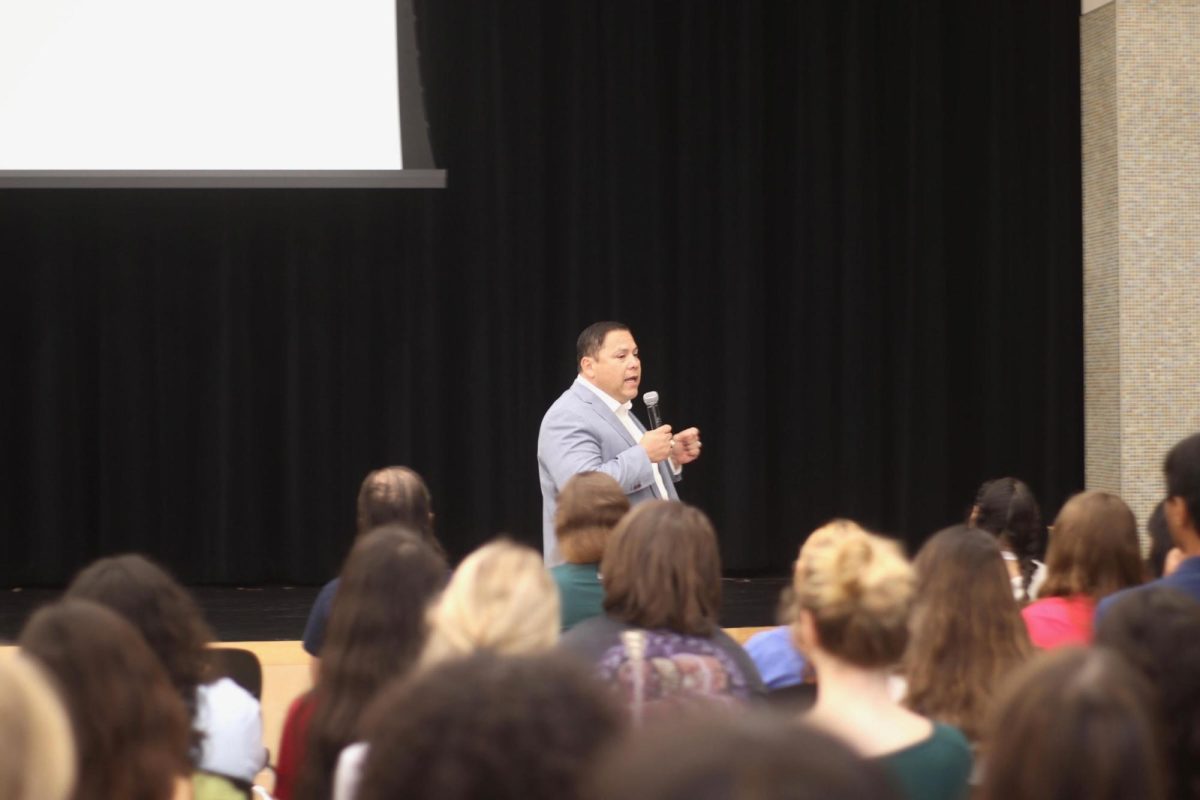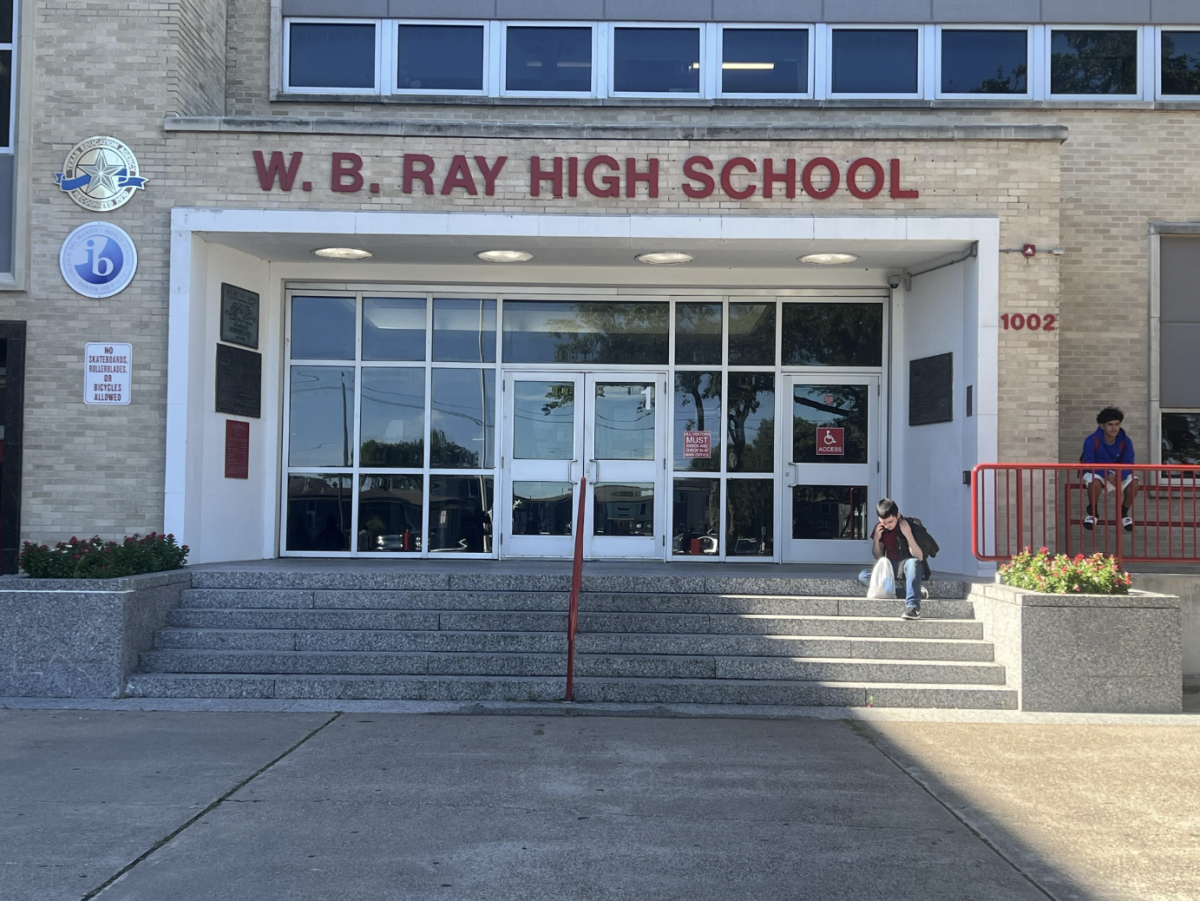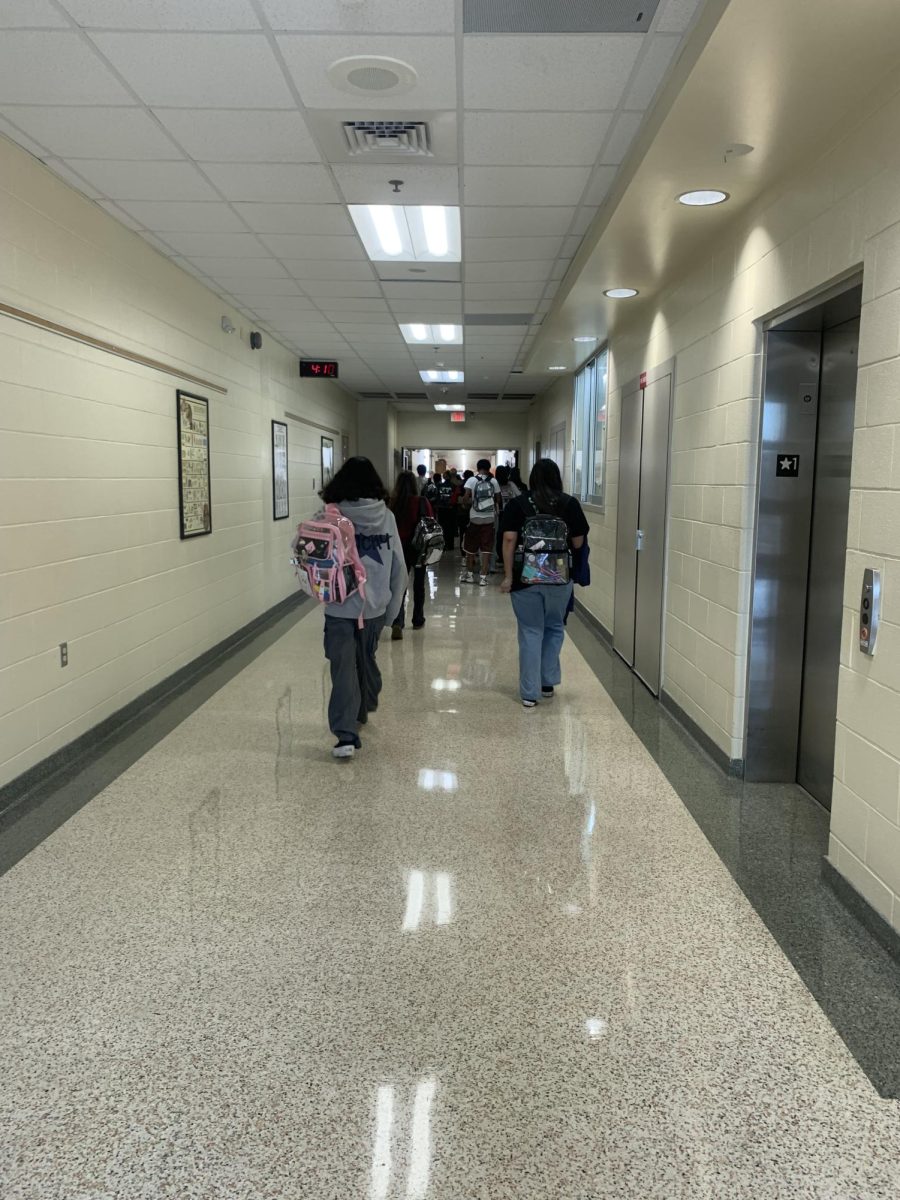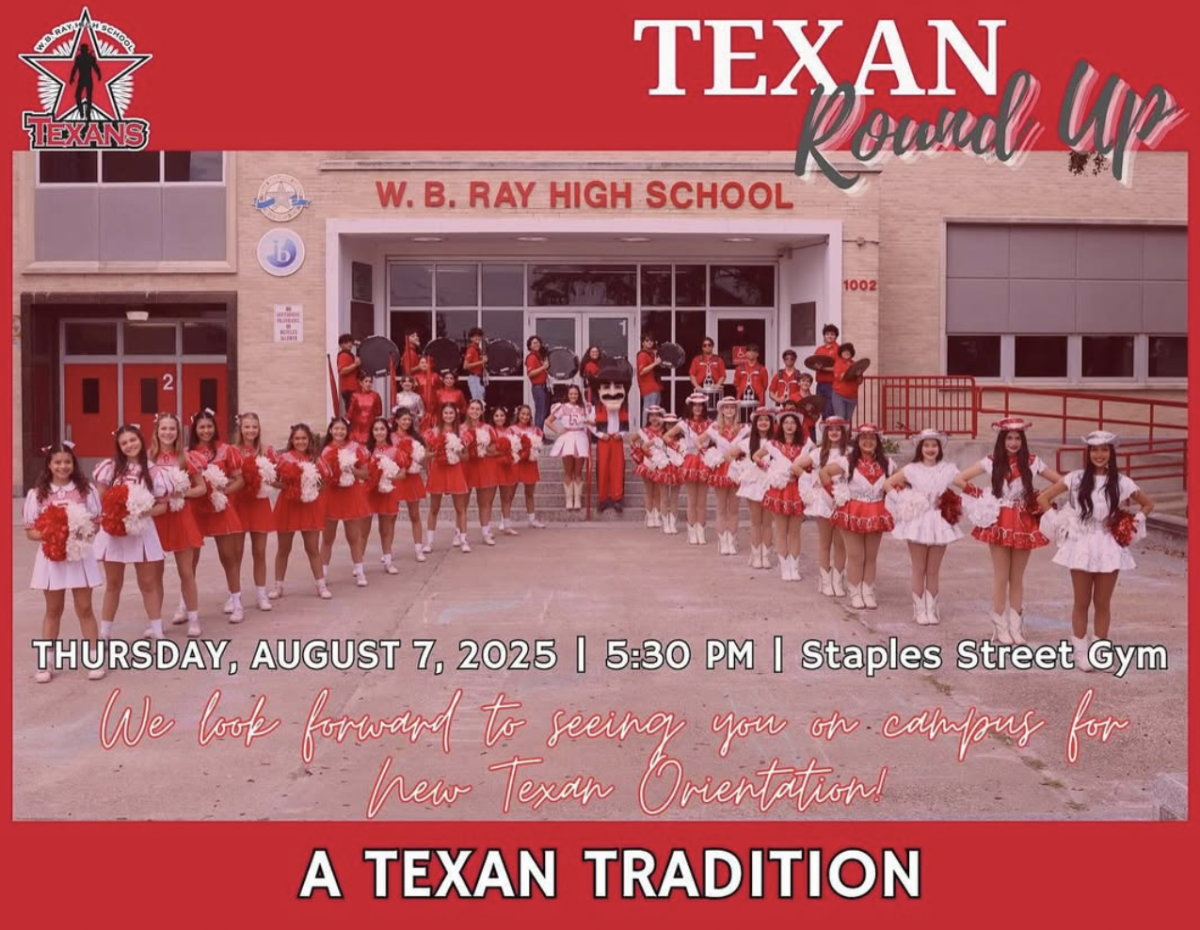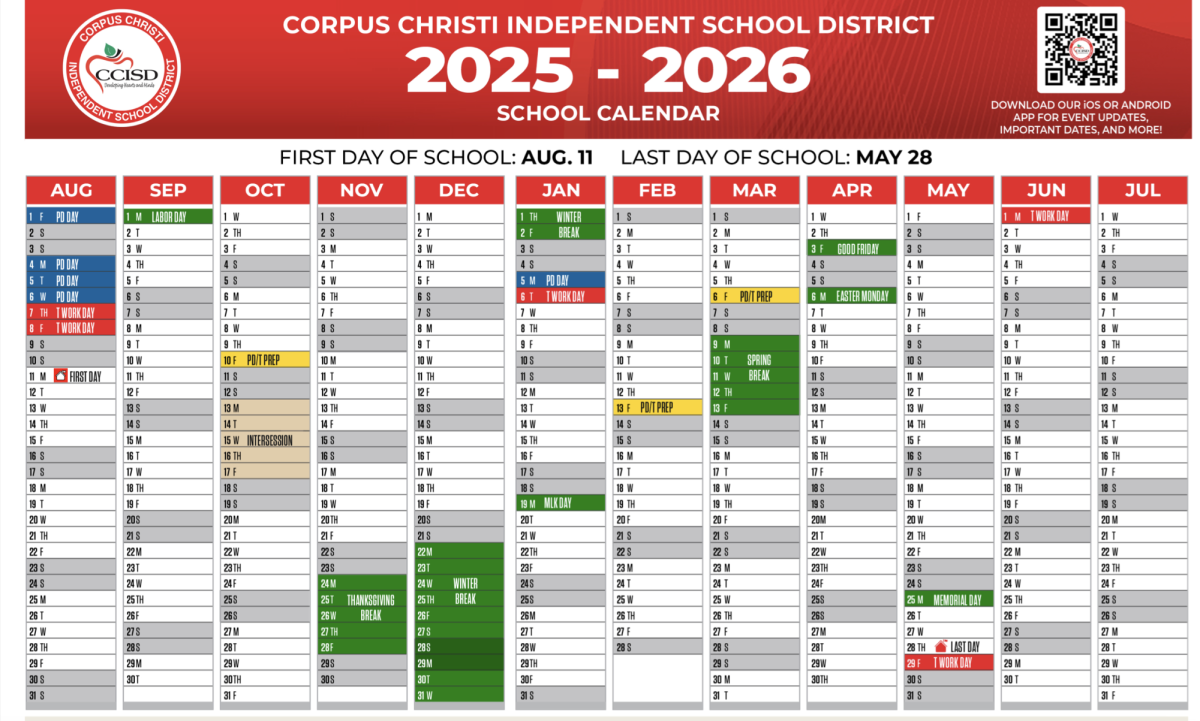On Wednesday, the World Affairs Council of South Texas presented the president and CEO of Kleberg Bank, speaking on topics like banks, federal economic policy, and local water use.
During his main speech, he explained his career journey and the role of community banks, like Kleberg Bank. Afterwards, he took questions from students, often stressing the independence of the Federal Reserve and managing the national debt.
IB Coordinator Lorinda Hamilton began the event by introducing the speaker as a former student of hers. “I’m on my 39th year (of working in education) … today I am proud to be able to introduce a former student from my 1987 class who had to suffer through me in my first year (Economics) class.”
He also discussed his career, which began at Ford Motor Credit Company, later becoming regional vice president for Wells Fargo before joining Kleberg Bank. He is also a board member for the San Antonio Branch of the Federal Reserve Bank of Dallas, a commissioner of the Port of Corpus Christi Authority, and holds other roles at the Independent Community Bankers Association of America and the Independent Bankers Association of Texas.
After introducing himself, Guerra explained how a community bank operates in comparison to larger ones.
“What makes a community grow in terms of the economy? It’s having good financial banks and capital in the community. Why do community banks still exist today? … It does have a lot to do with trust.”
“We lend to homes, we lend to small businesses. “If we’ve got several million dollars to lend someone, guess who’s part of that process? I am. If a big bank does that, they’re somewhere else, like a regional headquarters,” he continued.
In the latter half of the discussion, Guerra answered a variety of questions from the audience.
When asked by senior Daniel Lee about the impact of tariffs, he first mentioned the tax cuts in Trump’s ‘Big Beautiful Bill’ and government revenues in general. “One of the things people need to understand is why we collect taxes … to help fund our expenses, anywhere from Social Security to Medicare. Anything being cut affects that funding,” he replied.
“So you collect taxes and revenue for the US gov. Where else can you get revenue?” he asked the crowd.
“From tariffs and trading, some people say tariffs are a tax on people … and speaking as a banker, the consumer ends up paying for that.”
In another question, Guerra explained the basic functions of the Federal Reserve.
“You have the Fed that sets interest rates or (injects money) when things freeze up, do people stop spending and buy stocks? If the economy went really bad, (people) stop spending money, (the economy) freezes up … (the Fed) can put money back into the market when no one else is putting money in the market … that’s part of our great system and it’s independent,” he said.
“The unfortunate thing is that (the president is the one) in control of (appointments to) the Fed … (the president) would like to have all his people in the Fed. There was some talk today about Trump saying that you need to fire one of the Fed governors,” referring to Trump’s calls for Fed Reserve Board Member Lisa Cook to resign.
“And who gets to appoint Fed governors, the president. And who approves them? The senate,” Guerra said, ending his answer.
He also mentioned COVID stimulus and its effect on government debt, which became a recurring topic during the Q&A. “During COVID, trillions were brought into stimulus. (Today, 13%) of our budget goes into paying (interest on) debt … guess who pays for it: taxpayers,” he said.
Guerra also argued for the importance of foreign investment for the U.S. and Corpus Christi specifically.
“At the end of the day, think about the (2008 financial crash), what happened? The economy, housing crashed. … What helped the US get out of that crash? Besides the big bank bail out — foreigners came in and bought US real estate,” he said.
“I’m also a personal believer you can’t upset the entire world. I’ll give you some examples locally. Who owns the Exxon plant? Saudi Arabia business industries. Did you know the Saudis owned half the plant?”
He also went on to answer questions about other local issues, like Corpus Christi’s water shortage and the proposal to build a desalination plant.
“You can build desal plants, the problem is the cost. You’ve got to pay it as a resident. Some people can afford it versus others. You have to pay for it for 30 years. Desal is the most expensive. But, the best part about desal is that it isn’t finite”
“There’s an argument: should we pay for it, should we not? What other alternatives are there? … Should we recycle water? … There are things in between that are still cheaper, and that’s what the council is fighting about,” he said.
When asked about possible health or environmental impacts of local industry, he pointed towards a compromise between safe regulations and productivity.
“So whenever policy makers make a decision they have limited information … I think right now in Corpus we kinda have a juxtaposition here between (industry) and the people. How can we manage the well being of people and short term economic benefits?
“There are a lot of environmentalists who don’t say it’s good for the environment. … There are a lot of debates going on with those kinda things … with a lot smarter people than me … and there are people on both sides of the aisle. … (Exxon Mobil) guys told me (they) have thousands of regulations (they) have to abide by.
It’s a balance between balancing those regulations and production.
“But let me tell you right now if we shut down oil, what happens to Corpus Christi? … I don’t know who’s gonna live here,” he concluded.
Before the end of the event, senior Nathan Arias-Jara asked “If you were Greg Abbott would you let me have my phone during school?”
After discussing his high school experience growing up without phones and sharing his perspective on his daughters, he emphasized the importance of communication.
“The only thing I’m gonna tell you is that interpersonal skills are really important in life, you’re going to have to communicate with people. Whether you want to be a doctor, lawyer, or leader … My only challenge to you is to pick up the phone and
call people,” he replied.
“How do you communicate without your phones?” He then asked.
Students began talking among themselves, mentioning a variety of answers.
“That is bull, that is bull, that is bull. I walk into classes and people are on their phones,” Hamilton interjected.
